The Saturday Read: Whiplash
Inside: Trump’s soft power grab, Jeremy Bowen from Kyiv, the Sienese maestros, Lady Gaga’s return, The Leopard, Dante’s autofiction and Meghan Markle’s artifice.
Good morning. Welcome to the Saturday Read, the best of the New Statesman, in print and online this week. This is Finn with Nicholas and George.
Yesterday Donald Trump threatened Russia with sanctions in his ongoing bid to broker peace in Ukraine. In typically demotic vernacular, the President wrote: “Based on the fact that Russia is absolutely ‘pounding’ Ukraine on the battlefield right now, I am strongly considering large scale Banking Sanctions, Sanctions, and Tariffs on Russia until a Cease Fire and FINAL SETTELEMENT AGREEMENT ON PEACE IS REACHED.” (With apologies for shouting at such an hour).
“To Russia and Ukraine, get to the table right now, before it is too late. Thank you!!!” he added, somewhat more politely.
It can’t be anything other than an improvement for Zelensky – his Oval Office meeting last week descended into a shouting match and brought Ukraine/US relations right to the brink. Things have softened in the wake, thanks in part to Zelensky mollifying his tone. But it is hard for everyone to know where they stand. The US President has a habit of making threats and quickly backing down.
“Europe has spent a great deal of mental energy trying to understand Donald Trump” Andrew Marr wrote this week. Maybe he is not that complicated – his rashness is the most predictable thing about him. In that spirit, on Thursday Trump partially reversed the 25 per cent tariffs he leveraged at Canada and Mexico, just two days after imposing them. The market is confused, Trump is more erratic than ever, and he is surrounded by a coterie of yes men. But sudden jerking motions are risky in this economy. As one recent British premier learned the hard way.
As ever, thanks for reading and have a great weekend.
1—“The victim fought back”
As the future of Ukraine becomes a question of competing egos, it’s easy to forget the very real fight for national survival. Jeremy Bowen reports from Kyiv, and speaks to the Ukrainians hanging on the whims of a capricious President. NH
The world of suits, diplomacy and pool sprays seemed most remote in the encampments the Ukrainians have dug into the forests along the border with the Russian province of Kursk, where they are fighting to hang on to a pocket of land they seized last August in a surprise attack… One said he had more important things to think about: staying alive, killing Russians and living until tomorrow to do it again.
2—“Messianic posturing”
Soft and hard power are not opposites, John Gray advises. Britain has done a good job at squandering both – Europe too. Meanwhile the vibe shift orchestrated by Donald Trump proves his anarchic world “is the only game in town.” FMcR
At some subliminal level, Europe’s ruling caste appear to realise and accept their powerlessness. As Angela Merkel’s security and foreign policy adviser and German ambassador to the UN, Christoph Heusgen was one of the delegation sneering and laughing when in 2018 Trump warned against Germany’s reliance on Russian energy. As chair of the Munich Security Conference, Heusgen openly wept after vice-president JD Vance’s barnstorming speech, and his tearful breakdown was applauded by the audience of European notables. Beneath all their conceit and bluster, Europe’s elites are gripped by a Houellebecqian impulse of submission to a fate they suspect they cannot avert.
3—“Otherworldly and unexpected”
And now to Siena, in the days of the early Renaissance. Michael Prodger brings Duccio’s Maestà to life, with its rich lapis blues and sea of gold. Good news! You can see some of the Maestà yourself at the National Gallery’s exhibition on Sienese art. Michael assures me that it’s worth the trip. FMcR
What is dominant in the imagery is a new determination to engage with the biblical narrative by setting it in a recognisable rather than an abstract realm: the human and the numinous combined. These are still gold-ground paintings, the glittering backgrounds are an unequivocal statement about an omnipresent divinity, but the actors on the gilded stages are demonstrably human.
4—“Juvenile grasp of etiquette”
Most of us are by now pretty used to Zelensky’s military clobber. But after the Maga called a fit check on him last week, Finn re-examines the politics of the suit. What we have here is a dispute between old world and new world manners – or so she says. GM
But there is a reason Zelensky’s wartime outfit plays so well in the UK. Pictures of the Ukrainian leader, still not wearing a suit, smiling and shaking hands with Keir Starmer and the King after the White House incident has flattered a very British sensibility. Excessive concern with politeness (don’t swear! Do up your tie!) is actually an American, not British, trait. It is also the product of long-term outsiders finally being on the inside: Trump was never quite at home with the Manhattan elite; JD Vance’s career began with itchy resentment at his “hillbilly” provenance; journalists from outlets with names such as “Real America’s Voice” haven’t traditionally held a spot in the press corps. But we belong here, they promise, we understand the rules.
5—“How futile the winds of change”
Di Lampedusa’s The Leopard is the most celebrated novel in modern Italian literature; it has just been Netflix-ified. Here, Tanjil Rashid gives it a bravura critical treatment, taking in Georg Lukács, Antonio Gramsci and the motions of history itself. NH
Change, however dramatic the guises in which it comes, is an illusion: this is perhaps The Leopard’s enduring impression. In a now famous line, Don Fabrizio’s cherished nephew, an aristo turned Red Shirt jostling for power, declares: “If we want things to stay as they are, things will have to change.” Change, even revolution, is only a Trojan horse for the status quo, and in this vision of politics as a cynical masquerade, The Leopard turns out to have more in common with Machiavelli than the simple fact it concerns a prince.
To enjoy our latest analysis of politics, news and events, in addition to world-class literary and cultural reviews, click here to subscribe to the New Statesman. You’ll enjoy all of the New Statesman’s online content, ad-free podcasts and invitations to NS events.
“I have a spare ticket to the Cartoon Museum’s fundraiser–”
“Meh, to be honest I’m not really into–”
“It’s a champagne reception in Fitzrovia Chapel–”
“I love cartoons! Always have!”
So Thursday night I flitted off to the glitzy part of town, a casual moth to dispensed starlight. Caviar on roast potatoes, beef croquettes with watercress mayo, goats’ cheese crumpets with walnuts and honey – all in the Byzantine bonanza of a church where the King filmed his Christmas address.
Cartoonists still retain something of the truth-teller’s aura, the way the jester could speak his mind to the king. The profession made headlines in January after the Washington Post’s house draftswoman resigned in a fit of worthy protest: the paper’s owner, Jeff Bezos, had canned an unflattering sketch of him and Trump. Indeed, looking at the images in auction, the orange crayon had definitely seen the most use.
The charity was co-founded by Thatcher lieutenant Kenneth Baker, and there were several Maggieish hairdos among the trustees. I had found myself in the company of George Eaton’s newly coined and potentially caffeinated category: the Americosceptic Tories.
But then I had to dash – I was off to the O2 for the singer Gracie Abrams!
Alistair Phillips-Davies, chief executive of SSE, writes about how proposals for zonal energy pricing will do more harm than good. He argues that it will create a postcode lottery for consumers and will not change the location of the UK’s best renewable assets. Worse still, by creating uncertainty, he says, zonal pricing will raise the cost of net zero.
6—“The ideal of the artist”
Former Archbishop of Canterbury Rowan Williams schools the fools who called confessional autofiction a glib hobby of unambitious gen-Z poseurs. Dante was at it too, if you’ve heard of him. GM
Dante is trying to make sense of his disrupted and damaged life; and so he imagines himself, at the notional half-way point of a human existence (35), taking stock of all that has happened to him and of all the deep hinterland of his political and religious world. His enemies and rivals are in Hell partly so that Dante can be clear that his resistance to them is not purely personal; it is something to do with their deep antipathy to the truth. Everyone in Hell is there because they do not recognise their debt to the truth, they have preferred their own fictions; and they live, miserably, with the effects of that absurd choice.
7—“The fakery is enveloping”
Meghan Markle’s new TV show has landed, and Rachel Cooke is bewitched by all the artifice. This isn’t her house, she doesn’t seem to know how to cook – are these even her friends? Rachel’s is the best review you’ll read on the very strange affair. FMcR
I think she does know Daniel – together they make a culinary abomination she calls “single skillet spaghetti” – but about the other “friends” who drop by, I’m less certain. “You’re so tall!” she says to her pal, Delfina, a landscape architect, which I’m afraid did suggest to me a certain lack of familiarity. Alice Waters, the celebrated Californian cook, appears looking startled – as well she might in this land of let’s pretend.
How on earth had they got Waters on to this stage set? (The house where the series is filmed is not Meghan’s.) Was it a kidnap situation, or did they bribe her with the promise of carrot top pesto and heirloom chard?
8—“The best club in town”
NS creative editor and photon junkie Gerry Brakus heads to the National Portrait Gallery for a new photography exhibition. It’s a retrospective of the uber-modish Face magazine, which had its zenith across the 80s, 90s and noughties. If you weren’t there, or you weren’t invited, it’s a great chance to taste the cuisine at the cool kid’s table. GM
The Face was the voice of the counter-cultural youth hanging out in the skate parks, streets and clubs of the 80s and 90s; the style-conscious members of Generation X. It was more than a magazine – it was a bible, introducing its loyal readers to underground music, fashion and subversive ideas that no other publication was covering. Before the rise of the internet and the birth of social media, The Face could connect you to other like-minded individuals in a way that felt special. Every issue felt like a collectible – I still have a stack in my mother’s loft, over 20 years since I bought my last issue in the early Noughties. The magazine closed in 2004.
9—“Chaos is the starting point”
It’s probably been fifteen years since we first asked “What? Lady who?” The global superstar Lady Gaga is still making us wonder who she is. Her new album, Mayhem, is another triumphant return to her roots, writes the brilliant Kate Mossman. GM
She may have invented the model of the modern female pop star, but creatively Gaga’s legacy is less certain. She has an almost academically informed sense of the pop aesthetic, but her weakness is in clarity. When I think of her, I think of a craven character with wild eye makeup and big black nails: but who and what is that? The eras are not defined – in every music video, you’ll get a lot of ideas and little through line: very ADHD, which might be why she chimed so well with the first Gen Zs. She is an overthinker, yet there is little integrity to the imagery, despite the fact it is all so clearly profound and personal to her. A little like Galliano, it is all brilliant, talented, spectacular, but less hot on real meaning. She has been an intense and chaotic proposition from the beginning.
10—“Cannot afford to lose”
Once upon a time, Russia was the sworn enemy of the American right. Now Putin and Trump share a common enemy in liberal Europe. David Gauke wonders how this happened. NH
The US’s authoritarian right sees Putin as a strongman. He does not have to worry about judges or Congress or criticism on CNN. In reality, Russia has a small and fragile economy with a depleted and (for the most part) incompetent army which is currently making little progress at great cost in Ukraine. But in the eyes of the US right, Putin is the strong leader of a strong country heading for victory. Might is right.
George’s Best of the Rest
Sally Rooney: On Ronnie O’Sullivan. You read that right.
Zadie Smith: Trump Gaza number one
Declan Ryan: The hurt business
Jeannette Cooperman: Tom Wolfe anew
John Phipps: Tyler Cowen, the man who wants to know everything
Sophie Elmhirst: Helen Garner, suburban savage
Perry Anderson: Idées-forces
James Marriott: Bring back ideals
Major step in return of mammoth after scientists create “wooly mouse” One small step for mammoth…
And with that…
Much as Churchill is now a dog and Amazon is no longer a river, “Darcy” is, possibly irrecoverably, no longer the monied landowner of Austen’s imagination but an anvil-jawed human rights lawyer. That is: the Bridget Jones universe is now as vivid as any other in British culture, an indispensable guide to the types and characters that populate 21st-century England. Since he first sauntered onto our screens, who has forgotten Hugh Grant’s Daniel Cleaver, an oleaginous, grotesque character worthy of a Dickens novel? Stand aside, Steerforth.
Dickens’s satiric side was always leavened by his sentimentality. And that is equally the case in Bridget’s fourth cinematic outing, Mad About the Boy, which I belatedly caught this week. Widowed after the death of dear Darcy (killed during a humanitarian mission in Sudan, of course), Bridget is thrown into the confusion of romantic singledom and into the more profound unknown of single-parenthood. The latter plotline is by far the film’s strongest – and most moving. In fact, for only the third time in my cinema-going life, I found myself wiping away tears (previously Belfast and The Great Escaper, if you’re interested) when Bridget and her children sent letters to their missing dad, dispatched via helium balloon on Hampstead Heath. I was fortunately upstaged by my companion, whose weeping had begun less than ten minutes in. But our collective response to Bridget confirmed the emotional plumbing of the English heart: as with Austen and Dickens, it seems that the English can only truly loose their sentiments with the bow of comedy.
The New Statesman is home to the finest writing on politics, culture and ideas. To stay up to date, subscribe using the link above.
— Finn, Nicholas and George.





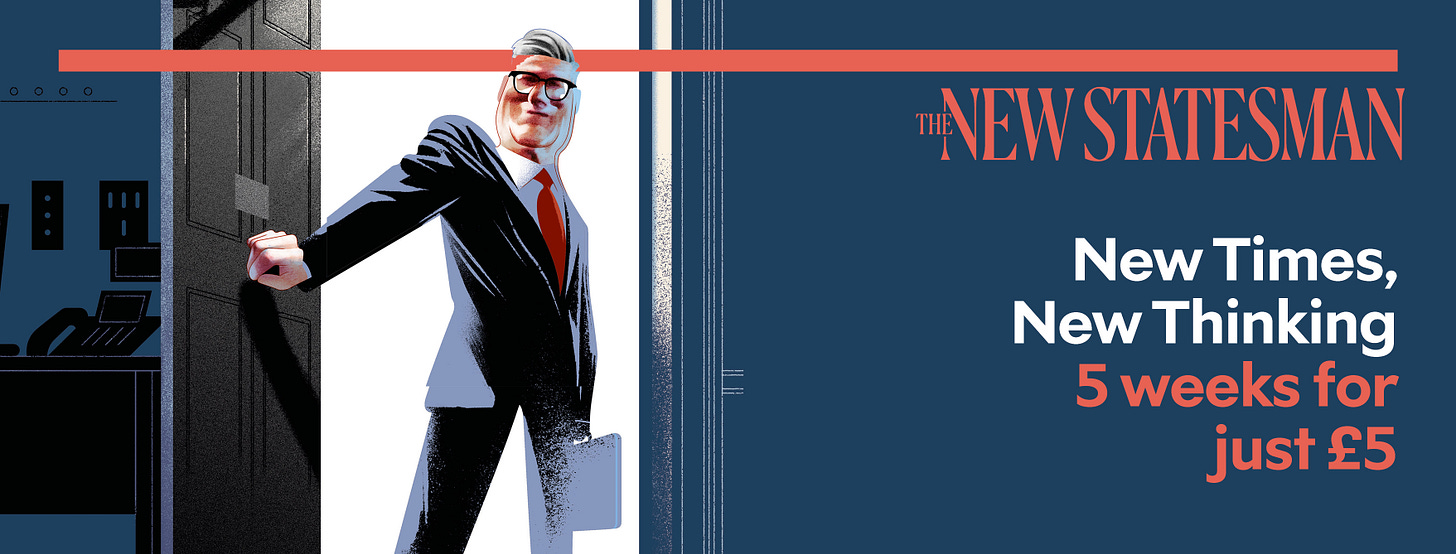

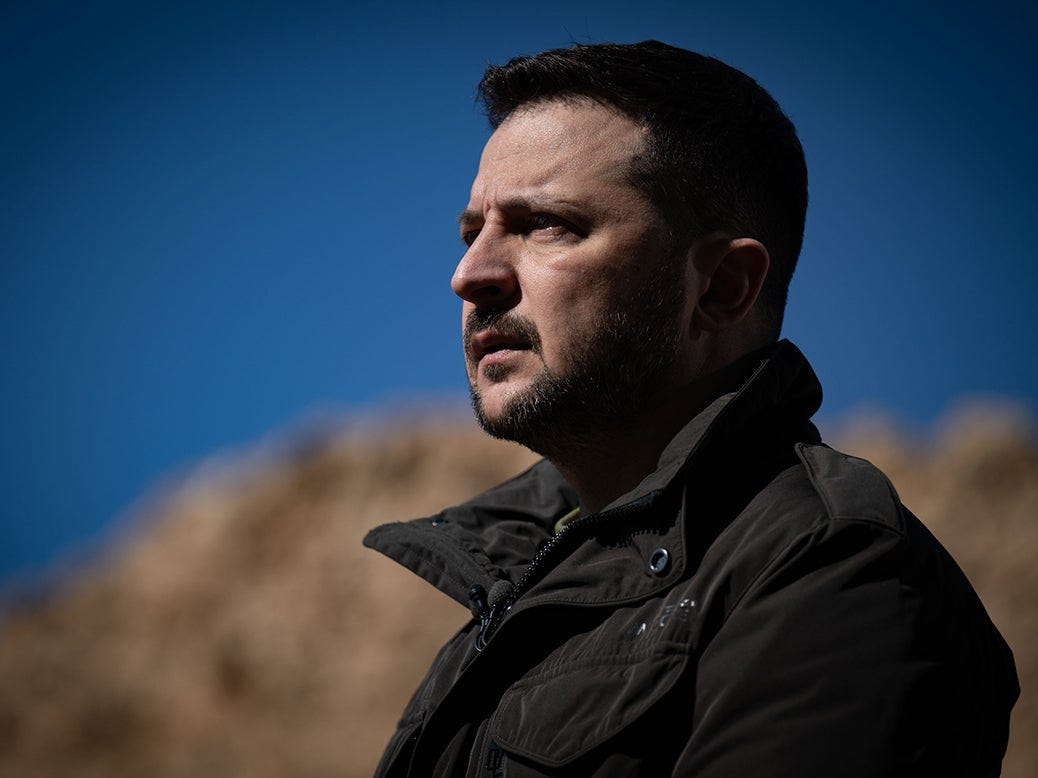
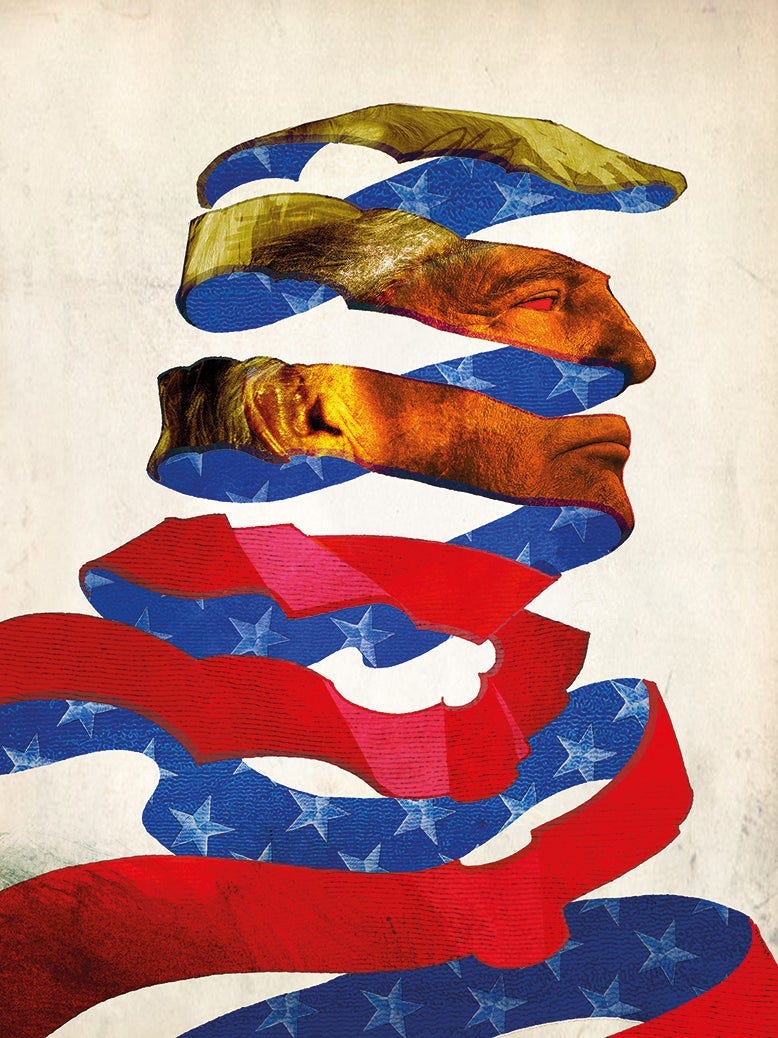
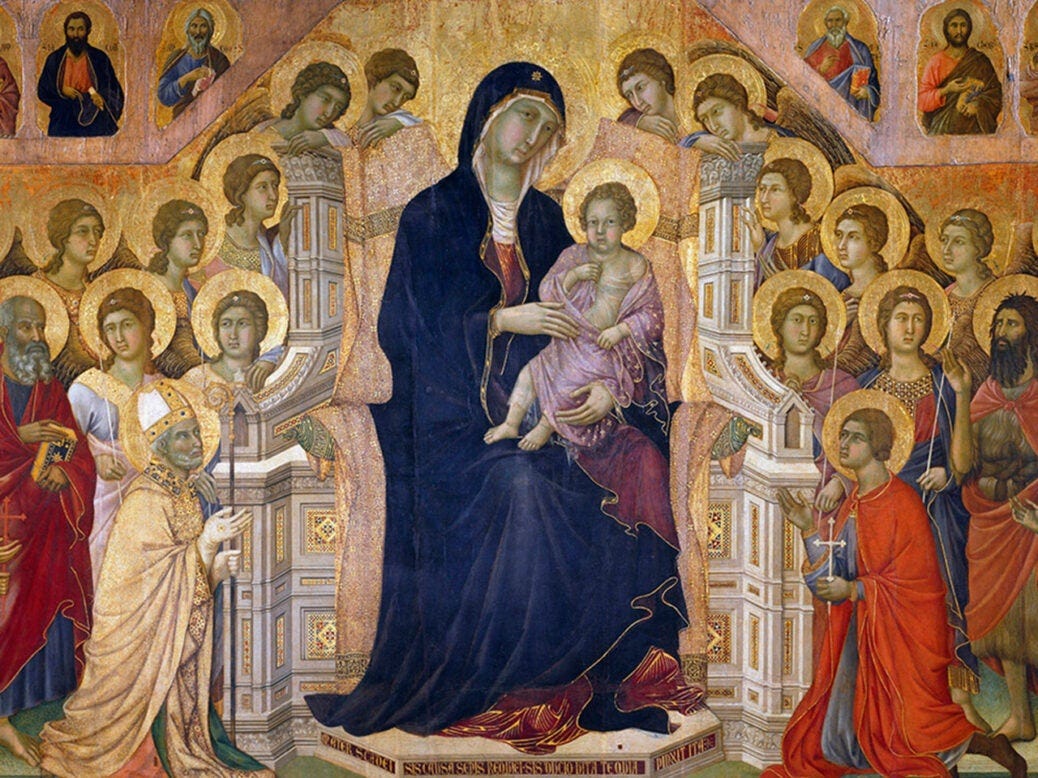

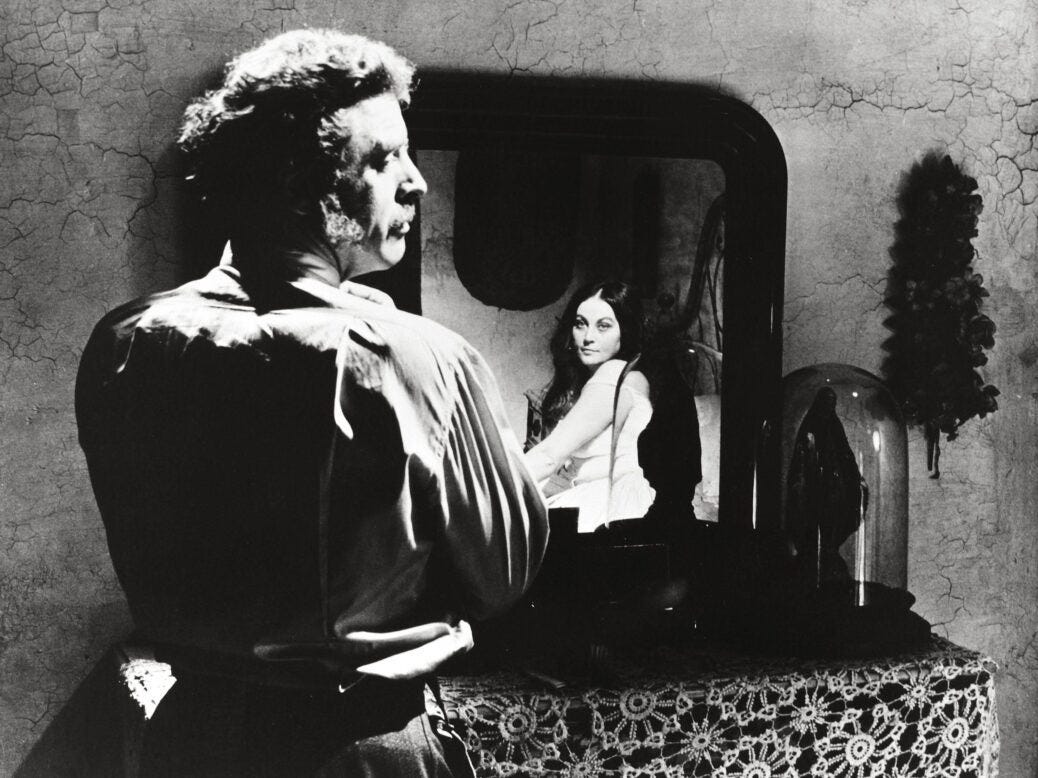








I usually like to read your contributions, but I draw the line at your Meghan Markle bit 🙄 I watched the show, and she does know how to cook. I think Rachel is envious. Meghan Sussex seems to get the white women early 40s-60s set very much up in arms 🤣 it must be rage at the puncturing of their princess dream or something 🤔 by the way - that single skillet spaghetti is scrumptious - tried it last night and I'm hooked! Very simple - can't think why I didn't think if it before 🤔 only one pan - yes!!
Another fantastic edition of The Saturday Read! The discussion on sudden changes and unpredictability really resonates—life often moves faster than we expect. Always appreciate the insightful perspective!